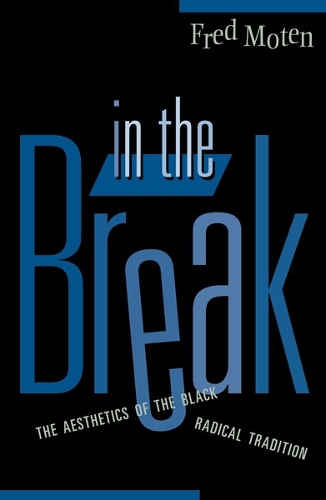
In The Break: The Aesthetics Of The Black Radical Tradition
(Paperback)
Publishing Details
In The Break: The Aesthetics Of The Black Radical Tradition
By (Author) Fred Moten
University of Minnesota Press
University of Minnesota Press
9th April 2003
United States
Classifications
Professional and Scholarly
Non Fiction
700
Physical Properties
Paperback
332
Width 149mm, Height 229mm, Spine 20mm
Description
Investigates the connections between jazz, sexual identity, and radical black politics
In his controversial essay on white jazz musician Burton Greene, Amiri Baraka asserted that jazz was exclusively an African American art form and explicitly fused the idea of a black aesthetic with radical political traditions of the African diaspora.In the Breakis an extended riff on The Burton Greene Affair, exploring the tangled relationship between black avant-garde in music and literature in the 1950s and 1960s, the emergence of a distinct form of black cultural nationalism, and the complex engagement with and disavowal of homoeroticism that bridges the two. Fred Moten focuses in particular on the brilliant improvisatory jazz of John Coltrane, Ornette Coleman, Albert Ayler, Eric Dolphy, Charles Mingus, and others, arguing that all black performanceculture, politics, sexuality, identity, and blackness itselfis improvisation.
For Moten, improvisation provides a unique epistemological standpoint from which to investigate the provocative connections between black aesthetics and Western philosophy. He engages in a strenuous critical analysis of Western philosophy (Heidegger, Kant, Husserl, Wittgenstein, and Derrida) through the prism of radical black thought and culture. As the critical, lyrical, and disruptive performance of the human, Motens concept of blackness also brings such figures as Frederick Douglass and Karl Marx, Cecil Taylor and Samuel R. Delany, Billie Holiday and William Shakespeare into conversation with each other.
Stylistically brilliant and challenging, much like the music he writes about, Motens wide-ranging discussion embraces a variety of disciplinessemiotics, deconstruction, genre theory, social history, and psychoanalysisto understand the politicized sexuality, particularly homoeroticism, underpinning black radicalism.In the Breakis the inaugural volume in Motens ambitious intellectual project-to establish an aesthetic genealogy of the black radical tradition
Reviews
"An ambitious work, In the Break shows that the classic opposition between singularity and totality is invalidated by black thought, history, life, and culture. In the Break is a truly original and inventive work that needs to be read and heard."Avery Gordon, author of Ghostly Matters
"Moten makes great sense of the authors complementary attractions of same and change."Rough Pages
"Fred Motens dynamic and ambitious In the Break explores the tension between jazzs social and aesthetic dimensions as the animating force behind the music, contextualizing the avant-garde work of the 1960s within a narrative arc that encompasses the entire history of the African diaspora."American Quarterly
"The result of Motens work is always more than a performance, more than the aggregate of gestures that falls within the valorized space of performative writing: In the Break marks an event according to the terms with which Moten describes itencounter, ensemble, improvisation, and the invocation of the knowledge of freedom."MLN
"Its a work that rewards careful study and repeated consultation, and invites extension, development, debate, and sustained intellectual improvisation on its protean themes."Cross Cultural Poetics
"In the Break mounts a poststructuralist assault upon the sovereign subject, disciplined sexuality, and gender training."American Literary History
Author Bio
Fred Moten is professor of performance studies and comparative literature at New York University.
